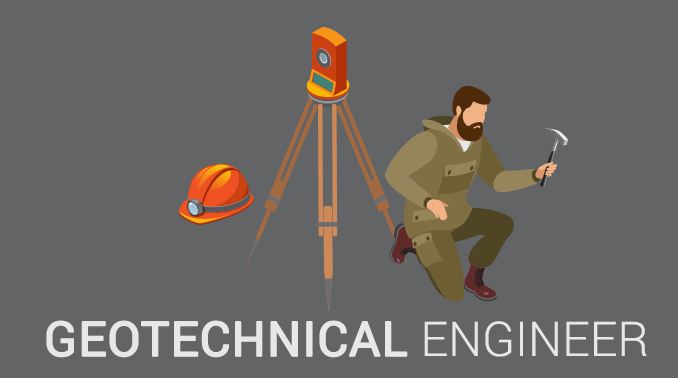A Biased View of Geotheta
Some Known Details About Geotheta
Table of ContentsThings about GeothetaHow Geotheta can Save You Time, Stress, and Money.Fascination About GeothetaUnknown Facts About GeothetaThe Facts About Geotheta Uncovered

They perform site examinations, accumulate samples, perform laboratory examinations, and assess information to assess the viability of the ground for construction tasks - Geotechnical Engineers. Based on their findings, geotechnical engineers supply referrals for structure layout, slope stability, retaining frameworks, and mitigation of geotechnical threats. They team up with other specialists, such as engineers, architectural engineers, and building and construction groups, to make certain that geotechnical considerations are integrated into the total project layout and application
By evaluating the actions and residential properties of dirt and rock, they can determine prospective geotechnical dangers such as landslides, dirt settlement, or slope instability. Their competence assists avoid failures or accidents that might threaten lives and property. Below are some thorough duties and responsibilities of a geotechnical engineer: Website Examination: Geotechnical engineers conduct site investigations to collect information on subsurface problems.
They translate the data to recognize the homes and habits of the dirt and rock, including their toughness, permeability, compaction qualities, and groundwater conditions. Geotechnical Analysis and Style: Geotechnical engineers examine the data accumulated throughout website examinations to analyze the stability and suitability of the site for building jobs. They execute geotechnical calculations and modeling to assess elements such as bearing capacity, negotiation, incline stability, side planet pressures, and groundwater circulation.
Geotheta Fundamentals Explained
Foundation Design: Geotechnical designers play a vital function in making structures that can securely sustain the desired framework. They evaluate the soil conditions and load demands to determine the ideal structure type, such as shallow foundations (e.g., grounds), deep structures (e.g (https://disqus.com/by/geotheta/about/)., piles), or specialized techniques like soil improvement. They think about variables such as negotiation limitations, birthing capability, and soil-structure interaction to create optimum structure designs
They assess building and construction plans, display website activities, and conduct area evaluations to confirm that the layout suggestions are followed. If unexpected geotechnical issues develop, they assess the circumstance and offer suggestions for removal or adjustments to the style. Risk Analysis and Reduction: Geotechnical engineers analyze geotechnical threats and dangers connected with the job site, such as landslides, liquefaction, or soil erosion.

Partnership and Interaction: Geotechnical designers function closely with various other experts associated with a job, such as engineers, structural engineers, and building teams. Reliable communication and cooperation are page important to integrate geotechnical considerations right into the overall task layout and building procedure. Geotechnical engineers give technological knowledge, answer inquiries, and make sure that geotechnical needs are met.
The smart Trick of Geotheta That Nobody is Discussing
Right here are some types of geotechnical engineers: Structure Designer: Foundation designers focus on designing and examining structures for structures. They assess the soil conditions, tons requirements, and site characteristics to determine one of the most proper structure kind and layout, such as superficial structures, deep foundations, or specialized strategies like pile foundations.
They review the aspects influencing slope security, such as dirt residential or commercial properties, groundwater conditions, and incline geometry, and create strategies to stop incline failures and reduce dangers. Earthquake Designer: Earthquake designers specialize in analyzing and designing structures to endure seismic forces. They analyze the seismic danger of a website, assess dirt liquefaction capacity, and establish seismic layout criteria to make sure the security and durability of frameworks during quakes.
They perform area testing, accumulate samples, and examine the collected information to characterize the dirt homes, geologic formations, and groundwater problems at a website. Geotechnical Instrumentation Designer: Geotechnical instrumentation designers focus on surveillance and measuring the habits of soil, rock, and structures. They set up and keep instrumentation systems that keep track of elements such as soil negotiation, groundwater levels, slope movements, and structural displacements to examine efficiency and give early cautions of prospective problems.
Not known Details About Geotheta
They carry out tests such as triaxial tests, consolidation examinations, direct shear tests, and permeability examinations to gather data for geotechnical evaluation and design. Geosynthetics Designer: Geosynthetics designers focus on the style and application of geosynthetic products, such as geotextiles, geogrids, and geomembranes. They utilize these products to improve dirt security, strengthen inclines, give drainage remedies, and control disintegration.
They have a tendency to be investigatory people, which means they're intellectual, introspective, and investigative. They wonder, methodical, reasonable, analytical, and rational. Some of them are likewise social, implying they're kind, generous, cooperative, person, caring, useful, compassionate, skillful, and friendly. Does this sound like you? Take our complimentary job examination to learn if geotechnical engineer is among your leading profession matches.
In the office environment, geotechnical engineers make use of specialized software devices to perform estimations, create designs, and evaluate information. They prepare reports, review project requirements, connect with clients and staff member, and coordinate task tasks. The office setting provides a helpful atmosphere for research, evaluation, and cooperation with other experts involved in the project.
What Does Geotheta Mean?
They regularly go to project websites to perform site examinations, evaluate geotechnical problems, and gather information for analysis. These visits entail traveling to various locations, occasionally in remote or tough surfaces. Geotechnical engineers may execute soil tasting, conduct tests, and display construction tasks to guarantee that the geotechnical elements of the task are being implemented properly.
Geotechnical engineers likewise operate in specialized geotechnical laboratories. In these facilities, they carry out experiments, carry out examinations on dirt and rock samples, and examine the design properties of the materials. Geotechnical lab designers function extensively in these atmospheres, taking care of testing devices, operating tools, and tape-recording information. They collaborate with various other laboratory staff to make sure precise and dependable testing results.